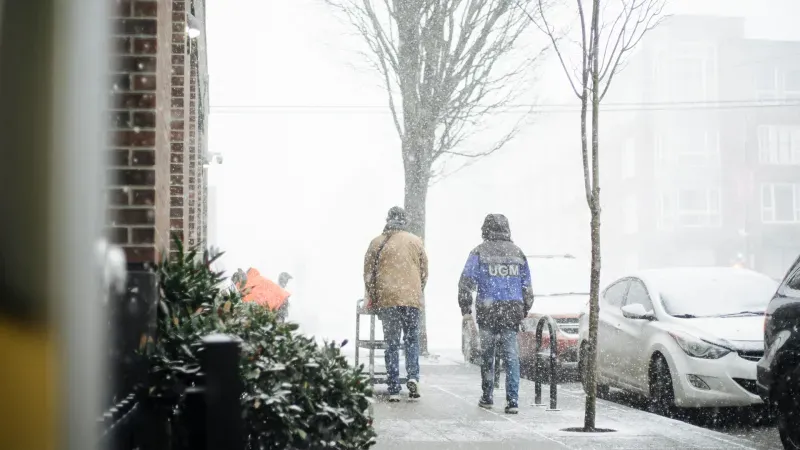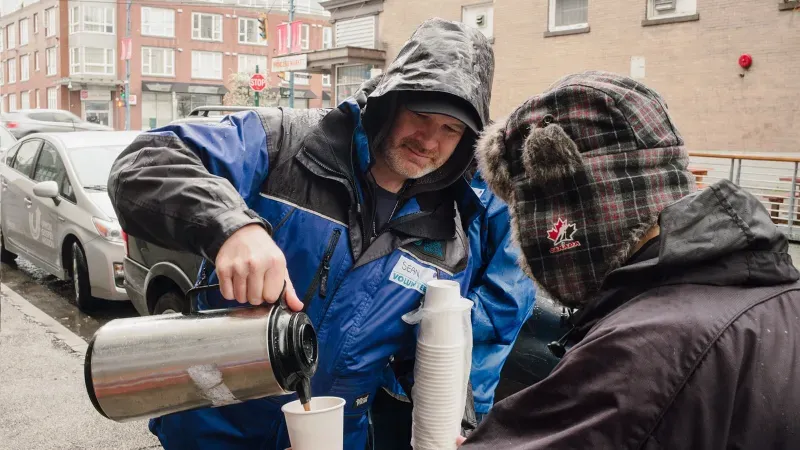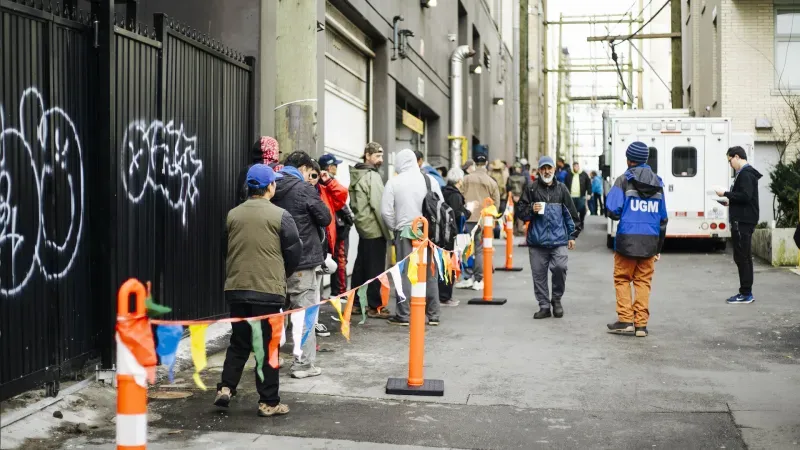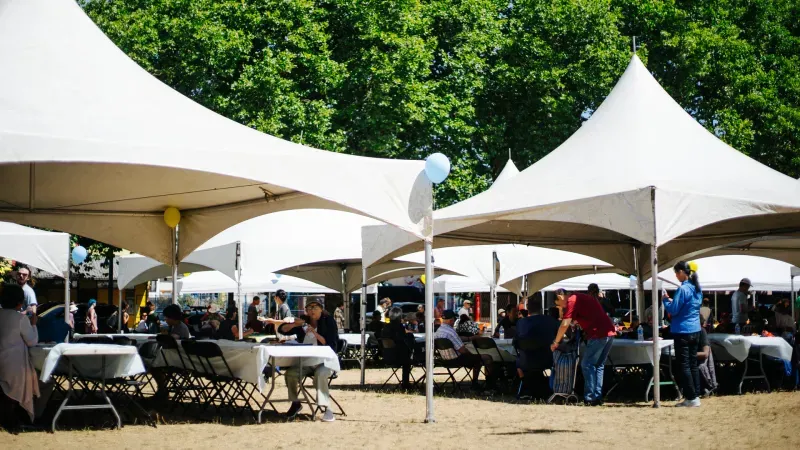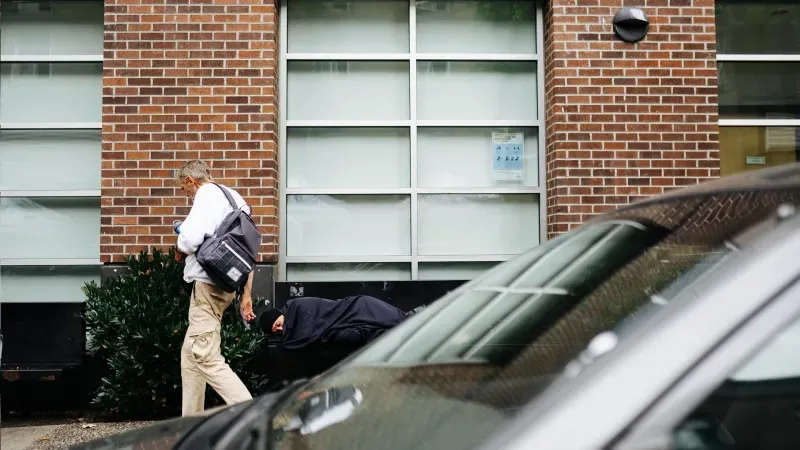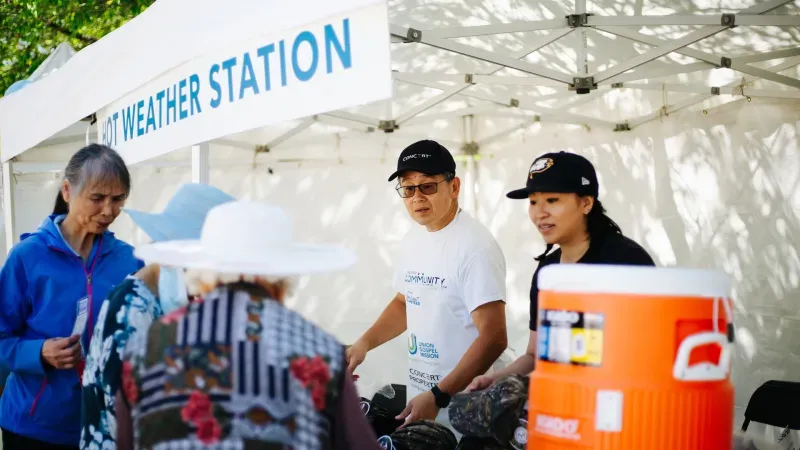
Unhoused Under Pressure
Homeless communities are feeling the full impact of the climate crisis. We need change now.
From extreme heat to air pollution, the impacts of climate change are hitting Vancouver's Downtown Eastside neighbourhood hard. As the climate crisis intersects with a housing crisis, people experiencing homelessness face compounding mental and physical health challenges as a direct result of these converging threats.
A new report highlights how climate change interacts with homelessness
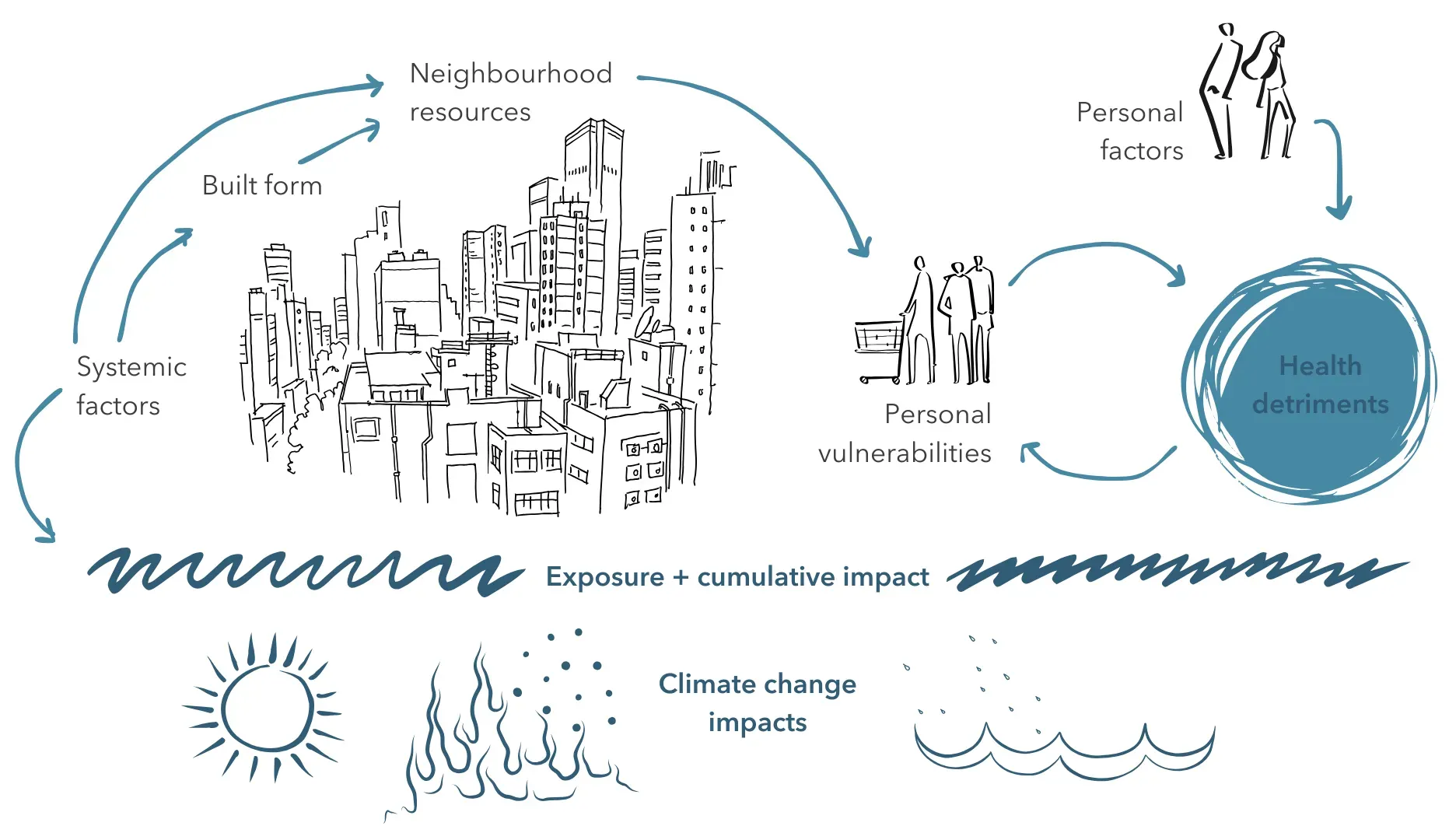
As illustrated above, when systemic factors, physical design, neighbourhood characteristics, and personal vulnerabilities co-occur with climate change impacts and disproportionate exposure, an individual may experience health detriments. These determinants often lead to increased personal vulnerabilities, perpetuating a cycle of health inequity.
In collaboration with the University of British Columbia's Sustainability Hub, UGM has produced the Unhoused Under Pressure report to shed light on the intersectional crises of climate change and homelessness.
Key Findings
Policy gaps and recommendations

Initiatives fail to consider the unique needs of unhoused residents
Commit to interventions that make a difference to unhoused communities during a climate emergency:
- Portable cooling devices
- Portable air filters
- Provision of water
Consider ways to support residents who cannot make an income during extreme weather events.

Insufficient resources allocated to the DTES
Allocate funding and other resources to support community-led initiatives and build the capacity of DTES community.
Prioritize housing initiatives in the DTES to significantly reduce exposure to extreme weather.

Lack of emergency preparedness
Draw on community insights from past events to create emergency plans with an equity lens.

Social stigma when accessing emergency centres
Implement measures to improve inclusivity:
- Make use of familiar spaces, or places where people can have a purpose
- Post opening hours widely, ensuring they're available offline
- Reserve space for carts, belongings, and pets
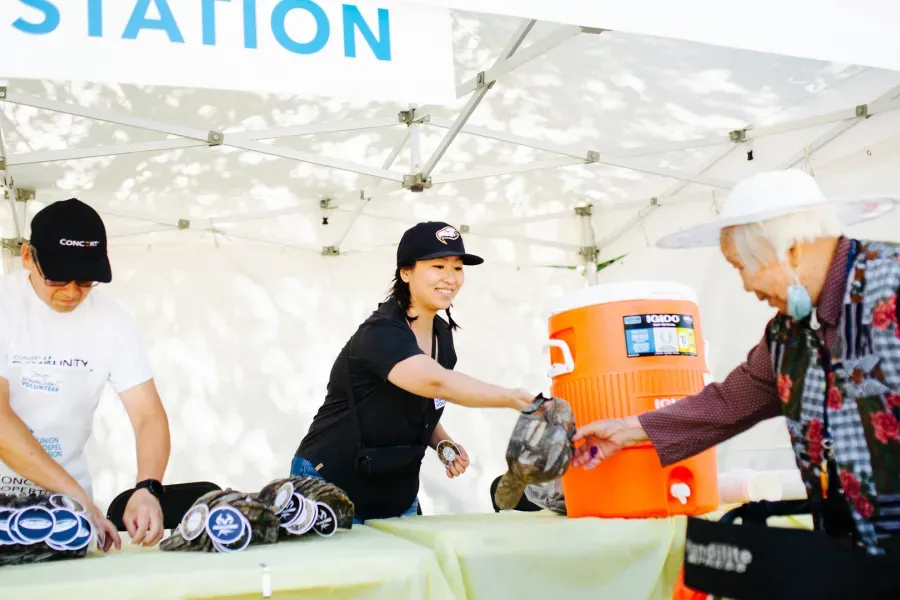
Extreme heat
“I’ve seen people handing out ice and water, fans were sold out everywhere, and a lot of people pouring water over themselves using the hose right by the Carnegie or whatever else they had.”
– Yvonne Mark, DTES Resident
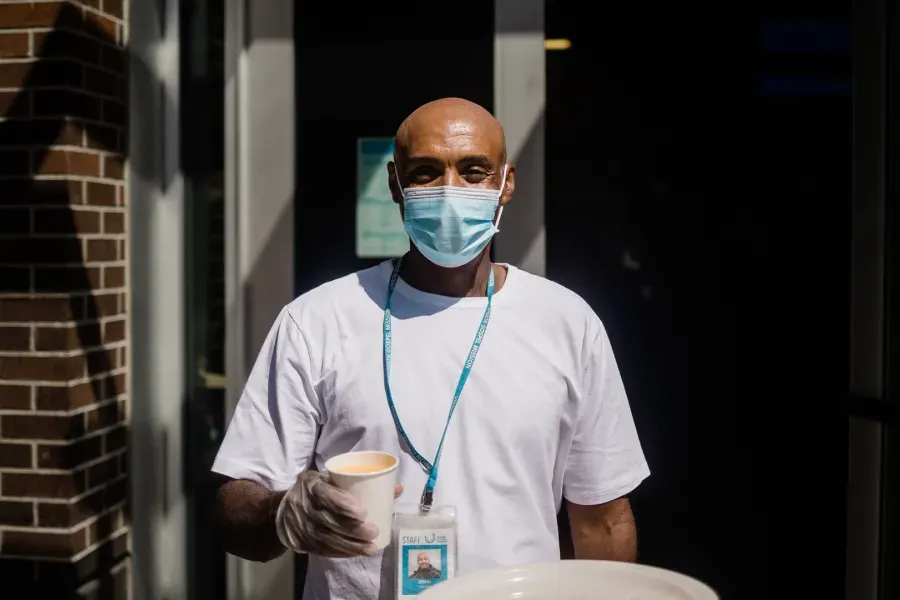
Air pollution
“My allergies act up, and my breathing gets more difficult. Pollution is a deterrent, a negative influence, but I don’t have a choice to change my behavior when I live out here. I’m just stuck with it. We all are.”
– DJ O’Brien, DTES Community Member
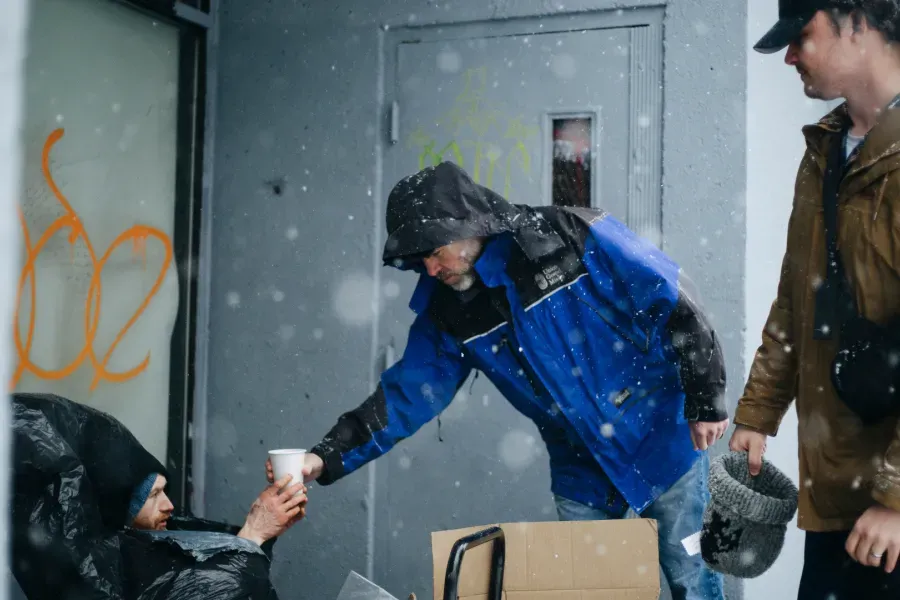
Cold and flooding
“When I moved to Vancouver in 1991, the weather was nice, although lots of rain. But 2021 — 30 years later — it was the worst change in climate: hot, cold and flooding, plus a wildfire that burned up a small town.”
– Stephen Scott, “What’s Next”, Megaphone Magazine
Workshops
UGM will be leading summer workshops to dive deeper into the Unhoused Under Pressure report. Learn from a panel of experts, meet new people and gain practical skills to help yourself, unhoused neighbours, and others mitigate climate change.
You can sign up for them below.
Extreme Heat
Wednesday, July 3 @ 5:30pm – 7:30pm
312 Main Street
Vancouver, BC V6A 2T2
Air Pollution & Wildfire Smoke
Wednesday, July 17 @ 5:30pm – 7:30pm
312 Main Street
Vancouver, BC V6A 2T2
Extreme Cold & Flooding
Wednesday, July 31 @ 5:30pm – 7:30pm
312 Main Street
Vancouver, BC V6A 2T2
Frequently Asked Questions
Unhoused Under Pressure explains that climate change and homelessness intersect to cause significant health impacts to the most vulnerable members of our communities. There are many factors at the personal and neighbourhood levels that the report delves into, but perhaps the most obvious is exposure – if you do not have access to reliable indoor shelter, you will be more exposed to extreme heat, cold, air pollution, flooding, or other climate events. Because homelessness and climate change are interconnected in this way, they have to be addressed together. If you care about one, you should care about both.
At UGM, we are seeing firsthand the impact that extreme shifts in weather are having on community members. From the tragic deaths during the heat dome in 2021, to the lack of shelter and warming spaces for community members, the challenges presented by a changing climate are directly felt by those we serve. The report is clear: those who are unhoused, underhoused, or at risk of losing their housing experience exponentially more adverse health impacts when facing extreme heat and extreme cold.
Union Gospel Mission worked in collaboration with the University of British Columbia’s Sustainability Hub to create this report. The primary author, Taryn Plater, a grad student at UBC’s School of Community and Regional Planning (SCARP), has lived in Vancouver for ten years and has experienced summers getting hotter and smokier, and winters getting colder. In her research she relied on the personal accounts of those who have or are experiencing homelessness, as well as previously published research and public policy to identify needs and gaps that exist when addressing the climate crisis for unhoused populations at the municipal level.
Unhoused Under Pressure links the impacts of climate change on the health outcomes of unhoused populations; they are difficult challenges that are only made worse if you are experiencing them when you are already part of a marginalized community. UGM’s primary focus on transforming communities must account for the impacts of climate change on a person’s health and housing.
UGM’s report was based on an analysis of local policy, grassroots initiatives, and related literature, making sure to prioritize the voices of those with lived experience of homelessness in the DTES in relation to climate change.
At UGM’s Vancouver location, we work everyday with community members who live in the DTES. In our report research we found that the DTES community “faces among the highest levels of overlapping hazards and risks of all of Vancouver’s neighbourhoods.” Extreme heat, air pollution, flooding and seismic risks are all concentrated in the DTES, with less urban greenspace to act as protection.
In Vancouver’s 2021 heat dome, 619 people died. Residents of the DTES reported limited access to water, cooling centres, and were not able to install air conditioners in their homes — either from lack of resources or because they were in SROs. People in the DTES struggle with compounding health impacts extreme heat or cold due to intersecting conditions like mental health challenges, addiction, inadequate housing, or being underserved in marginalized communities. At UGM, we want to bring attention to the intersectionality of the climate crisis and homelessness, and what needs to be done to ensure people in our community are able to thrive.
We spotted seven focus areas for municipal policies that we believe can make a drastic change to how unhoused communities are impacted by climate change:
- Decreasing exposure
- Providing access to water
- Prioritizing accessible and welcoming emergency spaces
- Prioritizing portable solutions
- Empowering DTES networks
- Streamlining access to funding
- Increasing urban greening
UGM recommends that the City of Vancouver strengthen its commitments to provide housing and health services, as well as continue supporting community-led initiatives, and empower the DTES community networks.
More details about next steps that can and should be taken to protect those who are most vulnerable and harmed by climate change can be found in the report.
UGM is non-partisan. In preparation for this campaign, UGM sought out local politicians who understand the severity of the climate crisis, and the impact it has on unhoused communities - particularly those in Vancouver’s Downtown Eastside (DTES) and asked them to respond to the findings & recommendations in Unhoused Under Pressure. We recognize that political responses and policy suggestions towards the issues surrounding climate change can be political, however UGM remains strictly non-partisan by focusing on the issues and how they impact the people we serve. Unhoused Under Pressure highlights the intersectionality of these crises because our community is disproportionately impacted by the rapidly changing climate. We are not endorsing or promoting one elected official over another – we are engaging in a public awareness campaign, inviting our audience to learn more about the impact that climate change has on those experiencing the challenges of homelessness, poverty, and addiction.
We all should be concerned about the impact of climate change affecting our cities, our neighbourhoods, and especially our most underserved and vulnerable communities. Unhoused Under Pressure shows how unhoused populations are experiencing a disproportionate impact to their health due to the increasing severity of the climate crisis. The DTES community is already experiencing and struggling through poverty, homelessness, and addiction, and if we want to transform lives, we need to address every barrier—including the changing climate—that people in the DTES are facing. It takes everyone, from service providers listening to communities they serve, to governments making policy changes, to people donating their money, time, and voices to make change.
We’re so glad you asked! There are so many things you can do to help.
If you want to tangibly help impact the lives of unhoused community members who are affected by the impact of the climate crisis, there are meaningful ways for you to make an impact! Scroll up to sign up for UGM’s workshops to learn more.
In addition to signing up for the workshops, you can also scroll down to sign up for UGM’s newsletter to be the first to read stories from community members, get information on how you can help, and receive updates on our latest initiatives.

